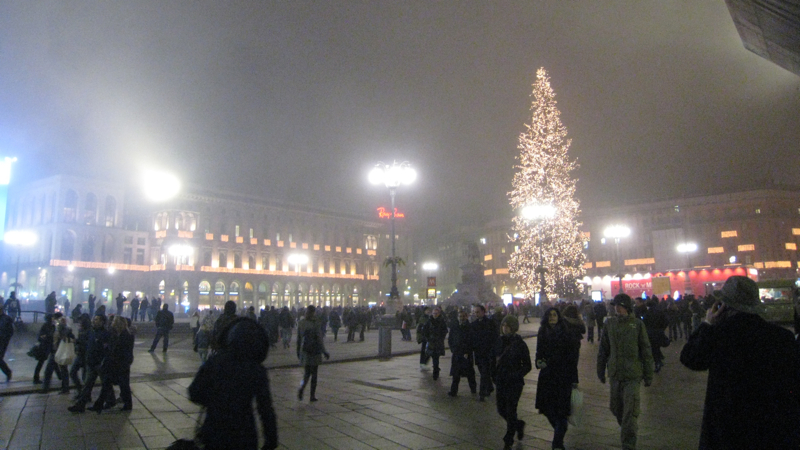Congratulate the neo-patentata! (newly-licensed [driver]) I finally had my road test yesterday; it had originally been scheduled for late October but, as it turned out, I was in Texas then. The driving instructor, Massimo, accompanied his mini-United Nations to the exam: one Italian teenager getting her first license; a Moldovan truck driver taking the first of many exams to be fully accredited to drive trucks in Italy; a young Egyptian man who didn’t say much; and myself. There were two other instructors, with one and two students respectively. This particular examiner is known to be quick, and on this day had some other appointment to get to, so he was moving at lightspeed. He didn’t spend more than ten minutes on any of us, and the only maneuver I had to perform was the inversione di marcia (reverse direction – a three-point turn). I was almost disappointed that I didn’t get to show off the parallel parking I had practiced so hard to master. (We had practiced reverse-in parking, too, though you rarely find that kind of parking space in Italy.)
So I have the new-style Italian driver’s license, credit card size, though it’s no more high-tech than the old paper ones – it doesn’t have a magnetic stripe or smart chip. Maybe it’s harder to counterfeit.
I’ll miss Massimo; he was good company for all those hours we spent in the car together. We did most of our driving within the confined area that the examiners use, in preparation for the exam, and it could have been (and sometimes was) very dull, seeing the same scenery over and over. I look forward to driving around some other parts of Lecco now.
The whole process cost me over 1,000 euros, but was the most efficient and certain way to a license. The driving schools have it all down to a fine art, based on many years’ experience. Their lessons for the theory exam are useful for recent immigrants who don’t speak Italian well and are taking the theory exam orally; when a new examiner joins the team, the driving instructors listen in on the oral exams to understand his personal style and favorite questions, so they can help a student prepare for any specific examiner. And they know the fine points that examiners will be looking for in the road test; in my final lesson yesterday morning, Massimo drilled it into me: “Don’t use the clutch when turning! He’ll say you’re not in control of the vehicle.”
The road test is run differently here than in the US. You use the driving school car (the same one you’ve been practicing in), and your instructor sits up front with you. The examiner sits behind you, and quietly tells you what to do. You just keep going forward unless and until he tells you otherwise. The instructor is supposedly there to use the second set of pedals in case something goes disastrously wrong, but he’s also allowed to clarify the examiner’s instructions if needed. In practice, the instructor does what he can to help, giving sly hints via a subtle nod that the examiner isn’t supposed to see.
Massimo’s other students followed in a second car (driven by another employee of the driving school). After my inversione di marcia, the examiner told me to pull over and park, and handed me my license. I signed for it, got out, and the teenager took the drivers’ seat, while I rode in the following car and chatted with the Moldovan. Then it was the Egyptian’s turn, then the Moldovan’s. We all passed.
Finally, we all rode back to the driving school together where our new licenses were photocopied (which makes them easier to replace if lost), and that was that.
I haven’t actually driven my “new” car yet (a hand-me-down from my father-in-law, who no longer drives). This afternoon I’ll drive Ross and her friend to their horses. Which could turn into an adventure. Hamish is now at a private stable on a mountain, inside the private property of a cement quarry and factory. The road from the front gate to the stable is mostly an unpaved mine access road, so you leave your regular car at the gate and drive a company jeep up the hill. The steep hill. With narrow tunnels carved out of the living stone, regulated by traffic lights. Oh, and I did I mention it’s raining…
Dec 3, 2003
Mike L. sent a few notes, comparing his driving exam experience in the Netherlands to mine in Italy:
Parallel parking is NOT a part of our exam. During the exam you will always perform two out of three maneuvers: Reverse direction as you described, taking a (short) turn backwards (you might consider this backward parallel parking), and reverse-in parking.
Driving away on a slope is also a standard item, but in Holland, its very hard to find a spot with enough a slope that would make the car go rolling backwards when you release the brakes! Usually, there is only one such place in a city, sometimes leading to a line-up of vehicles marked with a white-on-blue “L” waiting to practice…









